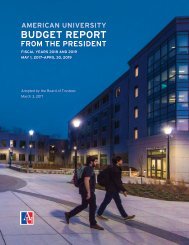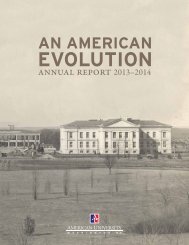American Magazine: November 2016
In this issue, delve into the Scandal-ous life of Judy Smith, meet ESPN’s new public editor, reflect on a decade of transformation under President Neil Kerwin, and learn more about autism—the fastest growing developmental disorder in the United States. Hop on the Metro to Capitol South and get to know a few of AU’s 1,068 Seattle transplants.
In this issue, delve into the Scandal-ous life of Judy Smith, meet ESPN’s new public editor, reflect on a decade of transformation under President Neil Kerwin, and learn more about autism—the fastest growing developmental disorder in the United States. Hop on the Metro to Capitol South and get to know a few of AU’s 1,068 Seattle transplants.
Create successful ePaper yourself
Turn your PDF publications into a flip-book with our unique Google optimized e-Paper software.
psychologist and cocktail of medications. “I’m<br />
now confident that he will have a successful<br />
life,” says Staley, who sits on the boards<br />
of the Autism Society of America and the<br />
Autism Society of Pittsburgh, where she and<br />
Mike live. “But I don’t know that I could’ve<br />
said that a few years ago.”<br />
Although the Staleys always knew their<br />
son was smart, they weren’t sure if college<br />
was in the cards. Of those with a disability,<br />
people on the spectrum are the least likely to<br />
attend college, according to a study published<br />
in the June 2012 issue of Pediatrics journal.<br />
Only one-third go to college, with the majority<br />
of them (81 percent) matriculating to a fouryear<br />
institution from community college.<br />
Jeff defied the statistics. The 23-year-old<br />
is now an information technology major at<br />
Marshall University’s College Program for<br />
Students with Autism Spectrum Disorder,<br />
which offers support around academics, social<br />
skills, and independent living. If students<br />
miss class, their grad student mentors come<br />
knocking; if they ask too many questions in<br />
class, they might be given a per-lecture-limit.<br />
Marshall’s program, established just 14<br />
years ago, is the oldest of its kind on a US<br />
college campus.<br />
people; I never thought he’d be able to do<br />
that,” Staley says. “It was a reminder that you<br />
always have to look for opportunities for your<br />
child to shine.”<br />
The doctor was half right when he<br />
told us things would get better. They would,<br />
but not immediately.<br />
An official diagnosis of ASD meant we<br />
could begin pursuing Applied Behavior<br />
Analysis (ABA) therapy. We also had an<br />
Individualized Education Program (IEP) in<br />
place with Montgomery County that entitled<br />
Owen to weekly sessions with occupational<br />
and physical therapists and a special educator.<br />
The only problem: None of the services<br />
would kick in until January <strong>2016</strong> and Owen’s<br />
daycare situation was growing more volatile<br />
by the day.<br />
He screamed in the morning when he<br />
realized it was a school day. He screamed when<br />
I dropped him off. He screamed at daycare—so<br />
much so that I was certain we were going to be<br />
asked to leave. I started using the back door so<br />
I could stay out of the director’s line of sight.<br />
She had already told us that four parents had<br />
complained about Owen’s outbursts; that made<br />
“It’s like getting oxygen on the airplane:<br />
you have to put your mask on first<br />
before you can help your kid. If you pass<br />
out, you’re no good to your child.”<br />
Now a junior at the West Virginia school,<br />
Jeff is thriving. Even his struggles are<br />
victories of a sort. “He discovered a social<br />
life,” laughs Staley. “That got the best of him<br />
for a while.” Still Staley, who works in human<br />
resources, worries about the budding video<br />
game designer. Can he sell himself in an<br />
interview? Can he stay focused when work,<br />
inevitably, becomes a grind? “In life—and at<br />
work, especially—you don’t always get to do<br />
things that you love.”<br />
Despite Staley’s worries, she’s learned<br />
never to underestimate her son.<br />
Last year, the Autism Society invited Jeff<br />
to speak at its annual conference in New<br />
Orleans, alongside NeuroTribes author Steve<br />
Silberman. “He spoke in front of 150 or 200<br />
—clinical psychologist Darren Sush<br />
me feel even more alienated from the other<br />
moms and dads, who looked at us with a mix<br />
of disdain and pity.<br />
When I picked him up, I would get a full<br />
report of Owen’s misdeeds from both the<br />
teachers and the kids, which was particularly<br />
brutal. (“Owie made me cry today.”) As an<br />
editor, I always begin my critique of a writer’s<br />
work by pointing out something positive; I<br />
was desperate for someone at Owen’s school<br />
to do the same. Yes, I need to hear about the<br />
outbursts. But can you also tell me about that<br />
awesome Lego tower he erected? Or how he<br />
puffed with pride when you asked him to be<br />
line leader?<br />
The last three months of 2015 were among<br />
the hardest of my life. All three of us were<br />
stressed; our unhappiness was palpable. A<br />
doctor once told Sam and me that it’s not<br />
Owen who is challenging. Rather, we are<br />
challenged as parents to adapt, to accept our<br />
son for everything he is and everything he<br />
might never be. At the time, though, I felt<br />
challenged just to get through the day.<br />
According to Los Angeles-based clinical<br />
psychologist Darren Sush, CAS/BA ’01,<br />
CAS/MA ’03, parenting a special needs<br />
child exacerbates everyday stresses. “Being<br />
a parent in and of itself is difficult. But the<br />
instruction manual for parents of kids with<br />
autism is completely different. Unfortunately,<br />
those challenges are often pushed to the side<br />
because there’s no time, there’s no money,<br />
there’s a guilt that comes with taking a<br />
moment for yourself.”<br />
A 2014 study by researchers at the<br />
University of Illinois found that 32 percent<br />
of mothers of children on the spectrum<br />
experienced moderate to severe levels of<br />
depression, compared to 18 percent of women<br />
with neurotypical youngsters. The trend holds<br />
true for fathers of kids with ASD, as well.<br />
“If parents are feeling a bit depressed,<br />
they’re less likely to participate in their<br />
kids’ lives, and that impacts the children’s<br />
progress,” says Sush, who went into private<br />
practice in 2013, working exclusively with<br />
parents of autistic children. “It’s like getting<br />
oxygen on the airplane: you have to put your<br />
mask on first before you can help your kid. If<br />
you pass out, you’re no good to your child.”<br />
Resentful, lost, lonely, sad. That’s<br />
how Owen’s diagnosis made me feel. It<br />
wasn’t until I met Kelly Israel, WCL/JD ’15,<br />
that I got some idea of what Owen might be<br />
experiencing.<br />
Israel, 27, was diagnosed with Asperger’s<br />
when she was about Owen’s age. A whipsmart<br />
little girl who lost herself in books, it<br />
was Israel’s “tempestuous emotions” that<br />
set her apart from the other children in her<br />
kindergarten class. Social anxiety led to tears,<br />
which led to outbursts that didn’t taper off<br />
until she was in her mid-20s.<br />
“When you have trouble controlling<br />
your emotions, it’s a constant battle against<br />
exhaustion,” Israel tells me over lunch near<br />
the Autistic Self Advocacy Network (ASAN)<br />
in downtown DC, where she works as a<br />
policy analyst. “Low-level anxiety follows me<br />
wherever I go.”<br />
FOLLOW US @AU_AMERICANMAG 21

















